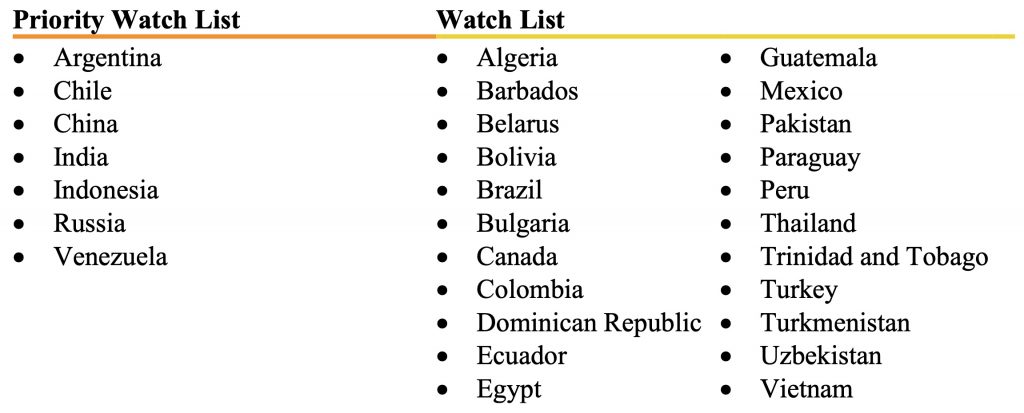
The 2023 Special 301 Report summarizes the adequacy and effectiveness of the protection and enforcement of intellectual property (IP) rights by international trading partners of the United States. It’s the latest of annual reports published by the Office of the US Trade Representative.
The deadline for submission of public comments closed at the end of January, and on February 13 for submissions by foreign governments. Through March and April, the USTR reviewed the 140 submitted comments, posed questions back to the submitters, and released the final Special 301 report at the end of April.
More than 100 trading partners were identified in comments submitted to the Special 301 Subcommittee, 29 of which were elevated to Watch List or Priority Watch List status.

Ukraine was excluded from the review due to the invasion by Russia in 2022.
Focus on piracy
The Report continues to highlight ongoing concerns related to online piracy and broadcast piracy. Examples include concerns related to stream-ripping, illicit streaming devices and related piracy apps, cable providers distributing pirated content, and illicit Internet Protocol television (IPTV) services. Stakeholders from both unions and companies in the creative sectors have underscored the importance of copyright protection and enforcement to their livelihoods and businesses.
The report details progress made through regulatory and legislative actions taken against piracy by the governments of Japan, Malaysia, Saudi Arabia, Canada, Thailand, Vietnam and Nigeria.
Mechanisms for cooperation and coordination between national government agencies were put in place by Thailand, India, Saudi Arabia, Brazil, Indonesia, and the Dominican Republic. Romania appointed its first national IP enforcement coordinator just last year, and is in the process of finalizing the country’s first national strategy for IP protection.
IP awareness and educational campaigns are underway in Spain, Algeria, the United Arab Emirates, Thailand, Japan, the Philippines, Korea, Nigeria and Côte d’Ivoire.
A variety of bi-lateral, regional and multi-national IP protection and enforcement initiatives among countries were also identified in the Special 301 report.
Concerns about China
The United States continues to monitor closely China’s progress in implementing its commitments under the United States-China Economic and Trade Agreement (Phase One Agreement).
The USTR has expressed serious concerns regarding IP protection and enforcement in China. While China continued to implement amendments to the Patent Law, Copyright Law, and Criminal Law through 2022, as well as previous issued measures, earning praise from rights-holders; the pace of reforms aimed at addressing IP issues has slowed.
Right holders continue to raise concerns about the adequacy and effective implementation of China’s measures, about statements by Chinese officials that tie IP rights to Chinese market dominance, and about long-standing issues like technology transfer, trade secrets, bad faith trademarks, counterfeiting, online piracy, and geographical indications.
Incremental progress
Several trading partners continued to advance IP protection and enforcement by enacting major legal reforms. For example, Thailand’s amendments to the Copyright Act entered into force in August 2022. Vietnam’s amendments to the IP Code entered into force in January 2023. Nigeria adopted the Copyright Act, 2022 in March 2023.
Some trading partners also joined major international IP treaties. Examples include Thailand and Tunisia acceding to the World Intellectual Property Organization (WIPO) Copyright Treaty (WCT). Tunisia also acceded to the WIPO Performances and Phonograms Treaty (WPPT), and Chile acceded to the Protocol Relating to the Madrid Agreement Concerning the International Registration of Marks (the Madrid Protocol).
Additional review
In addition to its annual review, the USTR will conduct an Out-of-Cycle Review of Bulgaria this year, to assess that country’s progress in allowing criminal investigations, expert examinations and prosecution of online piracy cases by focusing on a subset of seized infringing works through evidence sampling or by other methods. Such reviews, outside of the typical annual cycle, are intended to address specific cases that merit heightened cooperation among specific trading partners.
Further Reading
2023 Special 301 Report (PDF). Released April 26, 2023. Office of the US Trade Representative.
USTR Releases 2023 Special 301 Report on Intellectual Property Protection and Enforcement. Press release. April 26, 2023. Office of the US Trade Representative.
Posted Comments: 2023 Special 301 Review. Web site. Contains 140 comments submitted by public and industry stake-holders, between December 14, 2022 and February 13, 2023. Posted by the Office of the US Trade Representative on December 14, 2022.
Piracy remains rampant: Commenters to USTR Special 301 cite challenges, results. Article. February 7, 2023. Piracy Monitor. Contains details of some of the comments submitted to that date.
Why it matters
The Special 301 review and report are named after Section 301 of the Trade Act of 1974 (19 U.S.C. §2411), the statutory framework under which the “US imposes sanctions on foreign countries that violate US trade agreements” (CRS Reports)
The Special 301 Report complements the USTR’s annual Review of Notorious Markets for Counterfeiting and Piracy (aka “Notorious Markets List”), which was last released on January 31, 2023.
Based on the Special 301 review, the U.S. Trade Representative determines which, if any, of these countries to identify as Priority Foreign Countries. USTR requests written comments that identify acts, policies, or practices that may form the basis of a country’s identification as a Priority Foreign Country or placement on the Priority Watch List or Watch List.
The Report identifies a wide range of concerns, including:
- Challenges with border and criminal enforcement against counterfeits, including in the online environment;
- High levels of online and broadcast piracy, including through illicit streaming devices;
- Inadequacies in trade secret protection and enforcement in China, Russia, and elsewhere;
- Troubling “indigenous innovation” and forced or pressured technology transfer policies that may unfairly disadvantage U.S. right holders in markets abroad; and
- Other ongoing, systemic issues regarding IP protection and enforcement, as well as market access, in many trading partners around the world.
Combating such unfair trade policies can foster American innovation and creativity and increase economic security for American workers and families.












